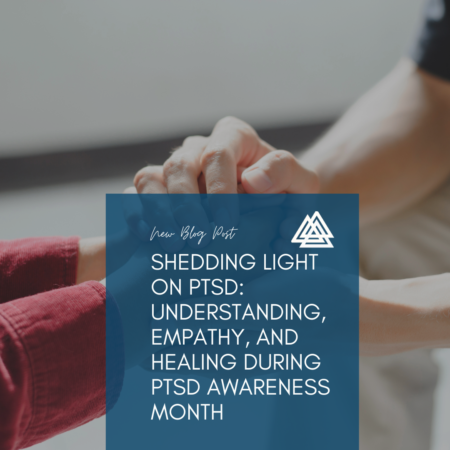 June is PTSD Awareness Month, a time dedicated to raising awareness about Post-Traumatic Stress Disorder, fostering understanding, and promoting healing. PTSD affects millions of people worldwide, yet it remains shrouded in misconceptions and stigma. By shedding light on PTSD, we can cultivate empathy and support for those affected, paving the way for recovery and resilience.
June is PTSD Awareness Month, a time dedicated to raising awareness about Post-Traumatic Stress Disorder, fostering understanding, and promoting healing. PTSD affects millions of people worldwide, yet it remains shrouded in misconceptions and stigma. By shedding light on PTSD, we can cultivate empathy and support for those affected, paving the way for recovery and resilience.
Understanding PTSD
Post-Traumatic Stress Disorder (PTSD) is a mental health condition triggered by experiencing or witnessing a traumatic event. This could include combat exposure, natural disasters, serious accidents, terrorist attacks, or personal assaults. PTSD can manifest in various ways, impacting individuals differently, but common symptoms include:
- Intrusive Memories: Recurrent, distressing memories of the traumatic event, flashbacks, or nightmares.
- Avoidance: Efforts to avoid reminders of the trauma, including places, activities, or thoughts associated with the event.
- Negative Changes in Thinking and Mood: Feelings of hopelessness, emotional numbness, difficulty maintaining relationships, or persistent negative emotions.
- Changes in Physical and Emotional Reactions: Being easily startled, feeling on edge, difficulty sleeping, or experiencing irritability and angry outbursts.
These symptoms can be debilitating, affecting daily life and relationships. It’s crucial to recognize that PTSD is not a sign of weakness; it’s a response to extreme stress and trauma.
Empathy and Support
Empathy and support play a vital role in helping individuals with PTSD. Here are some ways to foster empathy and provide meaningful support:
- Educate Yourself: Understanding PTSD is the first step towards empathy. Learn about the symptoms, triggers, and effects of PTSD to better comprehend what those affected are experiencing.
- Listen Without Judgment: Create a safe space for individuals to share their experiences. Listen actively and empathetically, without offering unsolicited advice or judgment.
- Encourage Professional Help: Support loved ones in seeking professional help from therapists, counselors, or support groups specialized in trauma and PTSD.
- Be Patient and Understanding: Recovery from PTSD is a long and often challenging journey. Show patience and understanding, recognizing that healing takes time and setbacks are part of the process.
- Promote a Healthy Lifestyle: Encourage activities that promote physical and mental well-being, such as regular exercise, healthy eating, mindfulness practices, and adequate sleep.
Pathways to Healing
Healing from PTSD involves various approaches, often tailored to the individual’s specific needs. Here are some common pathways to recovery:
- Therapy:
- Cognitive Behavioral Therapy (CBT): Helps individuals challenge and change unhelpful thoughts and behaviors related to the trauma.
- Eye Movement Desensitization and Reprocessing (EMDR): A therapeutic approach that uses guided eye movements to help individuals process and integrate traumatic memories.
- Prolonged Exposure Therapy (PE): Involves gradually and repeatedly confronting trauma-related memories, feelings, and situations to reduce their power.
- Medication: Certain medications can help manage symptoms such as anxiety, depression, and insomnia. These are often used in conjunction with therapy for more comprehensive treatment.
- Support Groups: Joining a support group provides a sense of community and understanding, allowing individuals to share experiences and coping strategies with others who have been through similar situations.
- Mindfulness and Relaxation Techniques: Practices such as meditation, yoga, and deep-breathing exercises can help reduce stress and improve emotional regulation.
- Service Animals: For some individuals, service animals, particularly trained dogs, can provide emotional support, reduce anxiety, and help with daily tasks.
PTSD Awareness Month is an opportunity to educate ourselves and others about PTSD, foster empathy, and support those on their healing journeys. By understanding the complexities of PTSD and providing compassionate support, we can help break down the stigma associated with this condition and promote a culture of healing and resilience.
Whether you or someone you know is affected by PTSD, remember that help is available, and recovery is possible. Together, we can shed light on PTSD, offering hope and healing to those who need it most.
